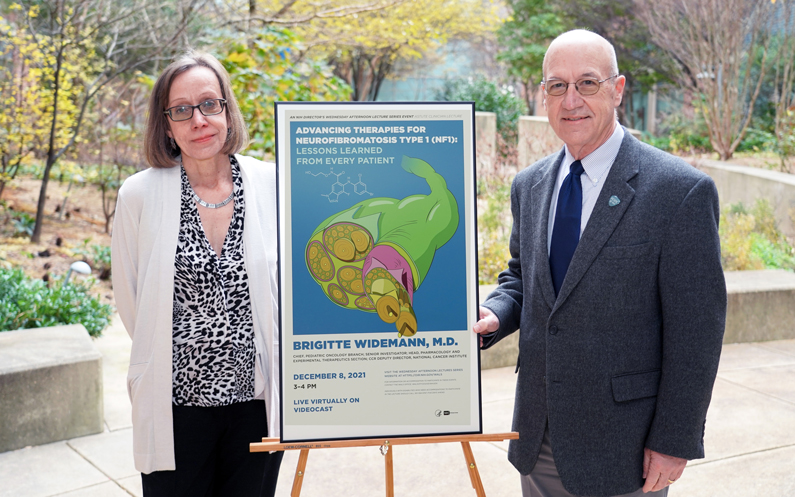NIH researcher recounts pursuing a treatment for childhood tumors
Astute Clinician Lecture describes 30-year search for a solution

In December 2021, Dr. Brigitte Widemann, Chief of the Pediatric Branch for the National Cancer Institute, presented the Astute Clinician Lecture, Advancing Therapies for Neurofibromatosis Type 1 (NF1): Lessons Learned from Every Patient.
Neurofibromatosis type 1 is a rare genetic condition people are born with and causes tumors to grow along the nerves. It most commonly occurs in children and can lead to the development of plexiform neurofibromatosis (PN) which can then progress to become a variety of tumors affecting the nervous system, as well as endocrine and gastrointestinal functions.
Symptoms tend to develop gradually over many years and can vary from person to person.
PN are slow growing but over time can occur on the face (including around the eye), neck, arms, legs, back, chest, abdomen and internal organs. They can become large and disfiguring and create significant physical and emotional distress for young patients.
Large tumors can cause a nerve to become thick and misshapen, which can affect the structure of nearby bone, skin and muscle and can cause severe pain, mobility problems, vision and hearing loss and high blood pressure. Most plexiform neurofibromas are not cancerous, but can develop into aggressive cancers.
Apart from complete surgeries, which were not guaranteed to resolve the condition, there were no effective therapies.
Widemann's research team hoped to change that. They measured growth and size of PNs by determining three-dimensional tumor mass, finding that younger pediatric patients showed the most rapid growth. Researchers also found that once started, tumor growth did not reverse or decrease in the slightest.
Early clinical trials did not reverse or halt progression of PN tumors when compared to existing natural history data. However, later studies using the medication selumetinib showed positive responses leading to reduced tumor size, lessened disfigurement and lower reported pain levels for many patients. Some pediatric patients participated in multiple trials, offering a basis for comparison.
In 2020, 30 years after the discovery of the NF1 gene, Widemann's pioneering research on NF1 resulted in the first U.S. Food and Drug Administration approved medical therapy, the MEK inhibitor selumetinib, for children with NF1 and inoperable, symptomatic plexiform neurofibromas.
Selumetinib has since been approved in other countries and a study of selumetinib for PN in adults is now underway.
"It was really a marathon, not a sprint," Widemann noted, remarking on the time and breadth of study required to arrive at an approved drug therapy for PN.
Widemann also mentioned the launch of a new NF1 natural history study and cited current and proposed cooperative studies inside NIH and with external researchers, with each one having the potential to enrich the broad scope of NF1 studies. She viewed this as a continuation of the progression of research that began 30 years ago.
The Astute Clinician Lecture was established in 1998 through a gift from the late Dr. Robert W. Miller and his wife, Haruko, to recognize U.S. scientists who have observed unusual clinical occurrences and, by investigating them, have opened an important new avenue of research.
View the lecture on NIH Videocast.
- Robert Burleson and Mickey Hanlon